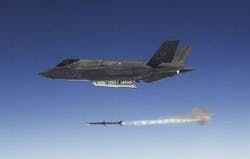F-35 air-to-air missiles can now hit two unmanned aircraft at once -- changing air combat
EDWARDS AIR FORCE BASE, Calif. – When a single F-35 used sensors, on-board computers, and targeting systems to find, track, and destroy two unmanned aircraft at the same time with air-to-air missiles, the fighter switched into a new era for offensive attack missions. Warrior Maven reports. Continue reading original article
The Military & Aerospace Electronics take:
2 Jan. 2019 -- Last year, an F-35 pilot fired two Advanced Medium-Range Air-to-Air Missiles (AMRAAMs) at maneuvering unmanned aerial vehicles (UAVs), bringing synchronized attack to a new level for the aircraft, using an integrated targeting sensor, called the Electro-Optical Targeting System (EOTS).
The F-35 is engineered with an ability to dogfight and engage in air-to-air combat, yet it was also designed with an array of next-generation sensors designed to see, detect and destroy enemy targets from much farther ranges than existing fighter jets can. The concept is to find, see and eliminate enemy air threats well before the F-35 itself can be detected.
The F-35 has identified and targeted a drone with its mission systems sensors, passed the target ‘track’ information to the AIM-9X missile, enabled the pilot to verify targeting information using the high off-boresight capability of the helmet mounted display, and launched the AIM-9X from the aircraft to engage the target drone.
Related: Air Force unmanned aerial vehicles and jet fighters to fire lasers by early 2020s
John Keller, chief editor
Military & Aerospace Electronics
Ready to make a purchase? Search the Military & Aerospace Electronics Buyer's Guide for companies, new products, press releases, and videos

